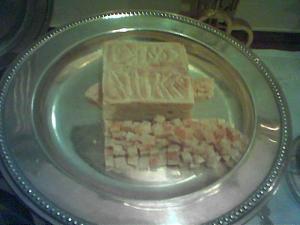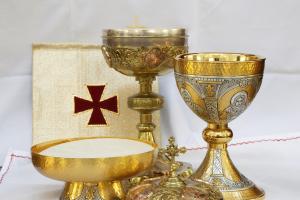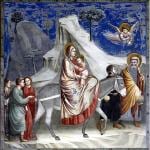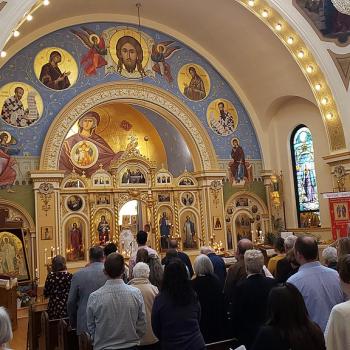
The eucharist, which is in reality Christ offering himself to us as spiritual nourishment, comes to us physically as bread and wine. We hand over the bread and wine to God who then takes those gifts and transforms them, giving them back to us as our super-substantial bread, the bread of life. What we receive appears to be bread and wine. It has all the physical characteristics (accidents) of bread and wine. Our physical interaction with the eucharistic gifts will be the same as if we received bread and wine. This is why those who have celiac disease have problems consuming the eucharistic bread, and alcoholics have problems consuming the eucharistic wine, because their bodies react to them according to the physical qualities of bread and wine. [1] The reality remains that it is Christ, but as St. Albert the Great explains, that reality affects us spiritually:
Now it is said commonly that the sacrament alone in this sacrament is the sacramental species, which consists in the accidents of bread and wine. The reality and the sacrament are the body of Christ contained under the species of bread and wine. The reality alone is the grace of spiritual nourishment, which per se and principally is brought about in this sacrament.[2]
The gift is a spiritual gift:
But the gift of Christ, which he has given principally in the gift of his body, is useful for a double reward, since it provides the restoration of what was lost of the spiritual life, and provides redemption, and so the gift is found to be exceedingly useful.[3]
This is also why we can receive the spiritual gift without the reception of the sacrament itself, that is, we can receive the thing of the sacrament (the truth of the sacrament) without its external physical form:
Now it is spiritual consumption or eating when the sacrament is taken to the extent of the reception of spiritual grace. And this happens in two ways, for sometimes spiritual [reception] is with sacramental [reception], and sometimes it is without , when the necessity of the situation and not contempt of religion excludes the sacrament.[4]
Spiritual communion is real, and allows us to receive Christ, so that those who receive Christ in this manner truly communes with Christ and receives what is necessary for their salvation. St. Albert follows after Peter Lombard who pointed out that we can receive the sacrament without the grace, the grace without the sacrament, or the sacrament with the grace:
And so there are three things to distinguish here: one, which is the sacrament alone; another, which is sacrament and thing; a third, which is thing and not sacrament. The sacrament and not thing is the visible species of bread and wine; the sacrament and thing is Christ’s own flesh and blood; the thing and not sacrament is his mystical flesh. [5]
We are told there is no life in us if we do not receive the bread of life, but we must understand, the reception of the bread of life can be in forms outside of the sacrament (which is why those who lived before Christ can and did receive that grace, and why, in the eschatological kingdom, that grace will likewise be available to all without need of the temporal liturgy).
When we receive Christ in the sacrament, the sacramental presence is temporary; Christ uses a physical means (the physical forms of bread and wine) to come to us; so long as we experience the physical presence of the accidents, we are assured of his real presence along with that physical experience. This does not mean we lose him. Rather, once that corporeal presence is gone, we still experience him, not physically, but spiritually, as Hugh of St Victor indicated:
Thus then in His sacrament now He comes temporarily to you and He is by means of it corporeally with you, that you through His corporeal presence may be raised to seek the spiritual and be assisted in finding it. When you hold His sacrament in your hands, He is with your corporeally. When you take it in your mouth, He is with you corporeally. When you eat it and when you taste it, He is with your corporeally. Finally in sight, in touch, and in taste, He is with your corporeally. As long as the sense is affected corporeally, His corporeal presence is not taken away. But after the corporeal feeling in receiving fails, then the corporeal presence is not to be sought but the spiritual is to be retained; the dispensation is completed, the perfect sacrament remains as a virtue; Christ passes from mouth to heart. [6]
We must remember that we receive the sacrament in order to be spiritually nourished, receiving God’s deifying grace. It is good for soul and body because of the union of soul and body – what is good for the soul will affect the body, but the full effects of that good will only be manifest eschatologically, in the restoration of the body at the eschaton. Christians still get sick, even after receiving communion. If they are sick, or have some problem with their body, such as blindness, they do not normally find themselves cured after the reception of communion. This is why it would be unwise to act like the eucharist is some sort of temporal medicine which will magically cure unwanted diseases or seen as some kind of vaccine against viruses. Its purpose is to nourish the soul, to help us overcome the evils of the soul, that is sin: “Therefore, this is the food causing health by preserving us from all the evils, which are the seven deadly [sins], and an eighth [evil] of blindness to truth.” [7]
The eucharist is food for the soul, but in order for us to understand this, Christ has us use bread and wine for the sacrament. We understand bread and wine as food. We understand how food helps us as by eating it, we stay alive. Likewise, then, when we understand the eucharist is food for the soul, we can realize that communion brings us abundant spiritual life. St. Thomas Aquinas, therefore, suggests it is fitting that Christ continues to come to us in the physical forms of bread and wine, because this helps us understand the intention of communion itself:
Spiritual effects were fittingly given under the likeness of things visible (as was said); therefore, spiritual nourishment of this kind is given to us under the appearances of the things which men rather commonly use for bodily nourishment.[8]
Physically, the characteristics of bread and wine remain, and so, Bulgakov tells us, we must not try to examine them, seeking them to be anything but bread and wine in relation to the physical world and its experience of them:
In this world and for the life of this world, the bread and wine remain bread and wine. Their transmutation is not a physical but a metaphysical transmutation; it transcends this world. This transmutation does not exist for this world, which is why the eucharistic elements retain all the properties of natural matter even after the transmutation. But these elements become Christ’s body and blood immediately, and as such, without any transformation. The transformation here is not a physical transformation of the bread and wine into the body and blood through a physico-chemical process. [9]
The physical qualities remain the same. To the world, to outsiders, the eucharist is mere bread and wine. But that is not what it truly is. Its reality transcends its external appearances. Its reality transcends its physical manifestation. The reality of what it is has changed. Christ offers himself to us, and we receive him in a form which he has chosen, in the form of bread and wine:
For the substance of the bread is directly converted into the substance of the body of Christ, but the dimensions of the body of Christ are in the sacrament by natural accompaniment, and not from the force of conversion, since the dimensions of the bread remain. In this way, then, the body of Christ is not related to this place with its own dimensions as medium, so that the place need be equated to those dimensions, but His body is here with the persisting dimensions of the bread as medium, and to these the place is equated. [10]
This is why what happens to the bread and wine physically do not happen to Christ himself; when the bread is torn up, or gnashed upon in one’s mouth, Christ’s body remains unviolated:
But because the body of Christ is incorruptible, it may truly be said that the breaking and division into parts is done not in the substance of the body, but in the sacramental form itself of the bread, so that there is a true breaking and partition there, which is not done in the substance, but in the sacrament, that is, in the species. [11]

Christ comes to us spiritually, giving us grace. We are nourished by the eucharist, truly receiving Christ, even though physically, what we receive is bread and wine. What happens to the physical form of the eucharist will follow through with what would happen if it were bread and wine, because that is what is meant when it is said the accidents of bread and wine remain. “And yet I know it is not formal, because the species of the things remain as they were before, as do their taste and weight.” [12] Again, this is why those who have problems digesting wheat have problems with the communion bread, and those who have problems with alcohol will have problems receiving communion wine. Saying this, accepting this, does not mean we deny the reality of the eucharist is that it is Christ; we do not deny transformation which takes place, but we realize that the glorious transformation is not a physical one; it does not change the accidents and how they interact with us in the world.
OOnce we understand this, once we understand, physically, the eucharist continues to act like bread and wine, we can answer many different questions which are given to us by those who deny the real presence of Christ in the eucharist. Yes, someone can die if poison is injected into the communion bread or wine. The poison is not the substance of Christ. It is not transformed into Christ. It is poison, and it acts with the eucharist like poison does when it is put into bread or wine. Similarly, this is why communion bread can and does get mold. This is why communion wine can make people drunk. This is also why, during a pandemic, the eucharist should not to be seen as offering us some sort of divine protection from illness; if some virus gets on communion bread or in communion wine, it can and will be received by those who receive that communion. Just as Christ doesn’t normally stop mold from forming on communion bread, nor save people who are poisoned while receiving poisoned communion, so Christ doesn’t stop the spread of any virus which can be found on communion (nor, of course, does it stop the spread of any such virus which is found within a church building). Communion is not an antidote to disease; communion is not a physical vaccine which will save us from illness. That is not what communion is for. Communion is for our spiritual regeneration and perfection. “We are cleansed by baptism; we are perfected in the good by the Eucharist. Baptism extinguishes the ardour of the vices; the Eucharist restores us spiritually.” [13]
When we receive communion, we are to be transformed, just as the bread and wine are transformed into the body of Christ. “Therefore, conformed in this way, we are changed into the food of the sacrament, which is the body of the Son of God.”[14] Just as baptism puts us into Christ, communion transforms us so we truly are a part of the body of Christ, receiving the Spirit of Christ (the Holy Spirit) in us. It allows us to be Christ’s presence to the world.
Similarly, through the eucharist, we are called to be united with all others in the body of Christ, making it the “sacrament of union”: “It must be received in the charity of ecclesiastical unity, since this sacrament is called the sacrament of charity and of unity by the fathers.” [15] Just as the eucharist remains in the form of bread and wine, so we remain physically ourselves; nonetheless, we are expected to be signs in the world, pointing to the unity which Christ would have us experience, a unity bound out of love. That love should motivate us and guide us so that we will work in the world, not for our own sake, but for the good of others. If we want to receive the eucharist worthily, we will let it transform us, so that all we do will be motivated by that love. If, on the other hand, we resist that transformation, we risk receiving the sacrament without the grace: “But without a doubt it is to be held that there are received by the good not only sacramentally, but also spiritually; by the wicked only sacramentally, that is, under the sacrament.” [16] If we ignore the well-being of others, if we ignore how we are to be responsible and act for their benefit, do we truly receive the sacrament worthily and receive its grace If we think we think we can receive the sacrament while putting others needlessly at risk while doing so, do we worthily receive Christ? We must remember that once we put on Christ, once we take on Christ into ourselves, we are no longer to think of ourselves and our own wants and desires and privileges above the need of others. If we do so, we have not truly learned the lesson of communion and truly do risk receiving the sacrament, not merely in vain, but in condemnation.
The eucharist is Christ. When we receive Christ, we can truly receive spiritual graces. Nonetheless, we must receive him properly. We must be open to others in communion. We must join ourselves to them with love. We must allow ourselves to be transformed by communion so that we become a part of Christ’s presence in the world. We must work together to promote what is good and true. We must not make the eucharist into something it is not meant to be; it is not sort of magical talisman. We must not create superstitions about it, suggesting it will protect us from all physical harm. That is not its point. That is not its purpose. Its point is to spiritually restore us with God’s deifying grace, and in doing so, to prepare us for the ultimate healing of our body, indeed, all creation, in the eschaton. But just as the accidents can be affected by the physical world around them, so we, who become the body of Christ through communion, can be affected by the physical world around us. It is true, God can and does do miracles through the means of communion, but we are not to put God to the test, we are not to force the issue. Snake handlers die thinking God will save them, and so can we, if we put God to the test, thinking God will save us if we do not act in prudence. If we were to try to test God by means of the eucharist, it only shows that we have not truly understood communion and its purpose. Communion is for our spiritual nourishment. It heals us from our sins as it lifts perfects us with its deifying grace. It is not a magical talisman. Let us not think of it or treat it as such.
[1] While what we receive is not, in reality, bread and wine, they are often called bread and wine due to their appearances. Likewise, Jesus called himself the bread of life, and so, as Lanfranc suggests, that also allows us to call what we receive bread. See Lanfranc of Canterbury, “On the Body and Blood of the Lord” in Lanfranc of Canterbury: On the Body and Blood of the Lord and Guitmund of Aversa: On The Truth of the Body and Blood of Christ in the Eucharist. Trans. Mark G. Vaillancourt (Washington, DC: Catholic University of America Press, 2009), 47.
[2] St. Albert the Great, On the Body of the Lord. Trans. Sr. Albert Marie Surmanski, OP (Washington, DC: CUA Press, 2017), 402.
[3] St. Albert the Great, On the Body of the Lord, 83.
[4] St. Albert the Great, On the Body of the Lord, 440.
[5] Peter Lombard, The Sentences. Book 4: On the Doctrine of Signs. trans. Giulio Silano (Toronto: Pontifical Institute of Medieval Studies, 2010), 45 [dist. viii c.7].
[6] Hugh of Saint Victor, On the Sacraments. Trans. Roy J. Deferrari (Cambridge: Medieval Academy of America, 1951), 314.
[7] St. Albert the Great, On the Body of the Lord, 123.
[8] St. Thomas Aquinas, Summa Contra Gentiles IV. trans. Charles J. O’Neil (Notre Dame: University of Notre Dame Press, 1975), 252-3 [c. 61].
[9] Sergius Bulgakov, “The Eucharistic Dogma” in The Holy Grail & The Eucharist. Trans. Boris Jakim (Hudson, NY: Lindisfarne Books, 1997), 110.
[10] St. Thomas Aquinas, Summa Contra Gentiles IV, 262 [c. 64].
[11] Peter Lombard, The Sentences. Book 4: On the Doctrine of Signs, 62 [dist. xii c.3].
[12] Peter Lombard, The Sentences. Book 4: On the Doctrine of Signs, 54 [dist. xi c.1].
[13] Peter Lombard, The Sentences. Book 4: On the Doctrine of Signs, 41 [dist. viii c.1].
[14] St. Albert the Great, On the Body of the Lord,, 147.
[15] St. Albert the Great, On the Body of the Lord, 255.
[16] Peter Lombard, The Sentences. Book 4: On the Doctrine of Signs, 47 [dist. ix c.2].
Stay in touch! Like A Little Bit of Nothing on Facebook.
If you liked what you read, please consider sharing it with your friends and family!













